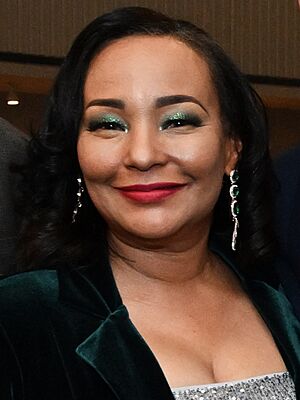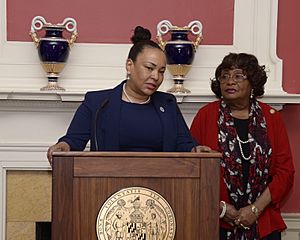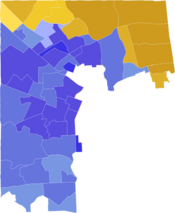Jill P. Carter facts for kids
Quick facts for kids
Jill Carter
|
|
|---|---|
 |
|
| Member of the Maryland Senate from the 41st district |
|
| In office May 4, 2018 – January 3, 2025 |
|
| Appointed by | Larry Hogan |
| Preceded by | Nathaniel T. Oaks |
| Succeeded by | Dalya Attar |
| Member of the Maryland House of Delegates from the 41st district |
|
| In office January 8, 2003 – January 2, 2017 Serving with Nathaniel T. Oaks, Samuel I. Rosenberg
|
|
| Preceded by | Wendell Phillips |
| Succeeded by | Bilal Ali |
| Personal details | |
| Born | June 18, 1964 Baltimore, Maryland, U.S. |
| Political party | Democratic |
| Relatives | Walter P. Carter (father) |
| Education | Loyola University Maryland (BA) University of Baltimore (JD) |
| Signature |  |
| Website | |
Jill Priscilla Carter (born June 18, 1964) is an American politician and lawyer. She was a member of the Maryland Senate from 2018 to January 3, 2025. She represented the 41st district in Baltimore. Before that, she was a member of the Maryland House of Delegates from 2003 until 2017.
Contents
Early Life and Education
Jill Carter is the daughter of Walter P. Carter. He was a well-known civil rights activist. He worked to end segregation in Maryland in the 1960s and early 1970s. Her mother, Zerita Joy Carter, was a public school teacher. She taught young children.
Jill Carter went to Western High School in Baltimore. She earned her Bachelor of Arts (B.A.) degree in English from Loyola College in Maryland in 1988. Later, she received her law degree (Juris Doctor) from the University of Baltimore School of Law in 1992.
Career as a Lawyer
After finishing law school, Jill Carter worked for Judge Kenneth L. Johnson in Baltimore City. This was until 1993. After that, she worked at different law firms. In 1998, she started her own law practice. In the same year, she also started the Walter P. Carter Foundation. This foundation honors her father's work.
Getting Involved in Politics
Jill Carter has been interested in politics since she was young. She even helped with political campaigns when she was a child.
Serving in the Maryland House of Delegates

In 2002, Jill Carter decided to run for the Maryland House of Delegates. This is a part of the state's government. She won the election and started her term on January 8, 2003. While in the House of Delegates, she was part of the Judiciary Committee. This committee deals with laws about the justice system.
Carter was known for speaking up on important issues. She often challenged other politicians. She focused on making sure poor people had good housing. She also worked on stopping lead poisoning in children. She pushed for more money for public schools. In 2007, she even asked for a special meeting of lawmakers. This was to discuss a big increase in utility prices.
In 2016, Carter was a delegate for U.S. Senator Bernie Sanders at the Democratic National Convention. After the convention, she supported Hillary Clinton for president. She felt it was important to prevent Donald Trump from becoming president.
On December 30, 2016, Jill Carter left the Maryland House of Delegates. She became the director of the Baltimore Office of Civil Rights and Wage Enforcement. In this job, she helped people with complaints about law enforcement. She also helped set up a board to review police actions.
Running for Baltimore Mayor in 2007
On January 16, 2007, Jill Carter announced she wanted to become the mayor of Baltimore. She wanted to take over after Martin O'Malley became governor. Her plans included changing the police leadership. She also wanted to increase money for education in the city. She lost the election to Sheila Dixon.
Serving in the Maryland Senate
In February 2018, Carter decided to run for the Maryland Senate. She ran against the current senator, Nathaniel T. Oaks. He was facing legal problems. Carter presented herself as an independent voice. She wanted to bring new ideas to the legislature. Her campaign received support from other politicians and community groups.
After Senator Oaks resigned in March 2018, Jill Carter was chosen to fill his spot. Governor Larry Hogan appointed her on April 30, 2018. She was sworn in on May 4, 2018. She won the Democratic primary election in June 2018. She defeated J. D. Merrill with 54.9 percent of the votes.
While in the Senate, Carter was a member of the Judicial Proceedings Committee. This committee handles laws related to courts and justice. Jill Carter resigned from the Maryland Senate on January 3, 2025. This was because Governor Wes Moore appointed her to a new position. She joined the Maryland State Board of Contract Appeals.
Running for Congress in 2020
On November 18, 2019, Jill Carter announced she would run for the U.S. House of Representatives. This was for the 7th congressional district. The seat became open after U.S. Representative Elijah Cummings passed away. Carter ran as a progressive candidate. She supported ideas like Medicare for All and the Green New Deal. She also wanted to end U.S. involvement in foreign wars. She lost the Democratic primary election to Kweisi Mfume. She placed third with 16 percent of the votes. She ran again in the regular election for the district but also placed third.
What Jill Carter Believes In
Jill Carter has strong views on many important issues.
Criminal Justice and Policing
Before her re-election in 2006, Carter criticized then-mayor Martin O'Malley's police policies. She believed that strict arrest strategies did not lower crime in Baltimore. Instead, she felt they led to many arrests that did not result in charges. She also asked for a federal investigation into the Baltimore Police Department.
In 2019, Carter introduced a bill to limit when employers could ask about a job applicant's criminal record. This bill became law even after Governor Larry Hogan tried to stop it. She also introduced "Anton's Law." This law made investigations into police complaints more open to the public.
Carter was against a 2019 bill that would let Johns Hopkins University create its own private police force. She was one of only two state senators to vote against it.
In 2020, Carter voted against a bill to make penalties for gun offenders stronger. She felt it was "more of the same old" strict crime policies that had not worked. She also introduced a bill to increase state money for programs that prevent violence. This bill passed but was stopped by Governor Hogan. However, lawmakers later voted to make it a law anyway.
In 2021, Carter introduced a bill to get rid of the Law Enforcement Officers' Bill of Rights. This law gave special protections to police officers. She also reintroduced Anton's Law, which became law. She supported a bill to limit no-knock warrants. These are warrants that allow police to enter a home without warning.
In 2022, Carter introduced a bill to change rules for young people in the justice system. It would stop putting first-time misdemeanor offenders in jail unless a gun was involved. It also said police could not question children without a lawyer present. This bill became law. She also introduced a bill to make police officers lose their pensions if they were convicted of a crime while on duty.
In 2023, Carter introduced a bill requiring private security guards to be licensed by the state. It also set training standards for security companies. Governor Wes Moore signed this bill into law. She also introduced a bill to stop automatically charging minors as adults for serious crimes. This bill did not pass.
Education
In 2004, Carter introduced a bill to make the Baltimore school board larger. It would have more members, some appointed and some elected.
Gun Control
In March 2013, Carter supported Governor Martin O'Malley's bill. This bill would ban certain types of rifles and require a license to buy a handgun.
In April 2016, after police shot a 14-year-old boy carrying a BB gun, Carter introduced a bill. This bill would ban making and selling fake guns.
In 2023, Carter was against a bill to increase penalties for illegal gun possession. She tried to add an amendment to allow people convicted of illegal gun possession to apply for probation. This would mean they might not have to go to jail.
Health Care
In 2009, Carter introduced a bill to stop the closure of the Walter P Carter Center psychiatric hospital.
Carter supports Medicare for All. This is a plan for a universal health care system. In 2020, she and state delegate Gabriel Acevero introduced a bill to create a universal single-payer health care system in Maryland.
Social Issues
In October 2002, Carter appeared in an advertisement. It supported a referendum to make the Baltimore City Council smaller.
In 2011, Carter supported a bill to legalize same-sex marriage in Maryland. However, she walked out during a committee vote. She wanted to draw attention to other important issues. These included education funding cuts and child custody laws. She did not co-sponsor the bill in 2012 but voted for it when it came to a vote.
In June 2015, Carter signed a letter asking to rename Robert E. Lee Park. In 2016, Carter introduced a bill to remove the Roger B. Taney Monument from the Maryland State House. She later changed the bill to send the statue to the Maryland State Archives.
In 2019, Carter introduced a bill to stop University of Maryland Medical System board members from having no-bid contracts with the system. This bill led to an investigation by the Baltimore Sun. The investigation found that several board members, including Baltimore mayor Catherine Pugh, had business deals with the hospital network. The bill passed and became law.
Images for kids
 | Emma Amos |
 | Edward Mitchell Bannister |
 | Larry D. Alexander |
 | Ernie Barnes |



